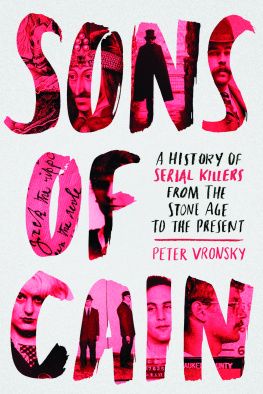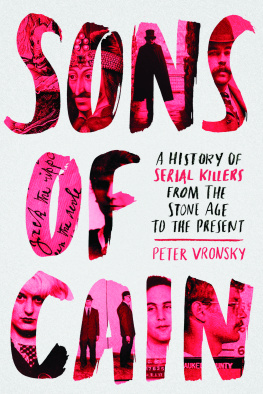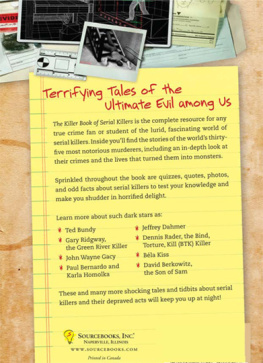Annotation
Rough justice has often been served in the pages of serial novels, notably beginning with Don Pendleton's The Executioner in 1969. This is the first overview of the serial vigilante genre, which featured such hard-boiled protagonists as Nick Carter, Mark Stone, Jake Brand and Able Team among the 130 series that followed Pendleton's novel. Serial vigilantes repeatedly take the law into their own hands, establishing and imposing their own moral standards, usually by force. The book examines the connections between the serial vigilante and the pulp hero that preceded him and how the serial vigilante has influenced a variety of tough guys, private eyes, spies and cops in different media. A complete bibliography for each series is featured.
Bradley Mengel
Serial Vigilantes of Paperback Fiction.
An Encyclopedia from Able Team to Z-Comm
Acknowledgments: I want to acknowledge and thank the following people for their support, advice, information and encouragement: David Aubrey, Matthew Baugh, Peter Coogan, Henry Covert, Chet Cunningham, Win Eckert, Lee Goldberg, Gillian Hallam, Andrew Henry, Keith Hetherington, Chuck Loridans, Patrick Lozito, John Mengel, Stephanie Mengel, Mike Newton, Dennis Power, John Small, Douglas Wojtowicz.
Library of Congress Cataloguing-in-Publication Data
To all the writers whose works made this book possible
Introduction
Some of my fondest memories from my childhood were staying up with my father and watching The A-Team, Knight Rider, Airwolf, The Equalizer and MacGyver. My first taste of what I came to call the serial vigilantes in a print format came a few years later, when I discovered The Destroyer series by Richard Sapir and Warren Murphy. Over time, I began to become curious about other similar characters. So I decided to find what information was available.
I found that there has been little written critically on this particular sub-genre of crime and mystery fiction. Critics like Julian Symons totally ignore the subgenre, it does not even rate a mention in any of the three editions of his crime fiction reference Bloody Murder.
I discovered an article by Alice K. Turner (1977) in the compilation Murder Ink and William Kittredge and Steven M. Krauser briefly discuss the type in the introduction of the anthology The Great American Detective (1978).
I also uncovered William H. Young's A Study of Action-Adventure FictionThe Executioner and Mack Bolan (1996), which examined The Executioner series in great detail and contained a chapter on other series but never really looked at what defined these series.
The internet was of limited help. Some series, such as The Butcher, were virtually impossible to find information on. Some websites provided inaccurate information (one site suggested that The Penetrator was first published in 1991 based on the fact that eight books from that series were reprinted at that time). I did find some very good sites on the Executioner and the Destroyer.
With this partial information, I began to collect the various series referred to in the above texts, discovering new series through advertising material and searching through used bookstores.
With the books, I was able to discover what made these series unique as well as allowing me to:
Name the sub-genre,
Create a definition for the sub-genre,
Identify and describe series belonging to the sub-genre.
Nomenclature
The nomenclature of the sub-genre is not consistent. The publishers of these books label them as fiction, novel, horror, crime, adventure, action /adventure and men's action. And the categories can be changed from book to book within the same series; for example, Pinnacle books labeled the Destroyer #55: Master's Challenge as fiction, the Destroyer #56: Encounter Group as men's action and the Destroyer #58: Total Recall as action/adventure. With this level of inconsistency there is a need to turn to critical sources to name the type.
Turner (1977) labels the type as "the paperback hero" or "paperback series hero," basing the name on the fact that nearly every series was published exclusively in the paperback format. While this is an accurate assessment, the label is too general; a number of spy, private eye, western and crime series were also published as paperback originals. Turner's list includes characters that do not fit the mold of what she is trying to describe.
Also Turner claims that the paperback hero started in 1969 with the publication of the first Executioner novel by Don Pendleton. The listing of series includes Jonas Ward's Buchanan, Donald Hamilton's Matt Helm, John D. MacDonald's Travis McGee and Gerard De Villiers' Prince Malko Linge series (see Malko), which made their debuts between 1956 and 1965.
While Turner does make some interesting comments on the sub-genre, she appears to be unclear on what does fit into the group, including western and private eye series as well as the revival of Kenneth Robeson's pulp hero, The Avenger, onto her list.
Young (1996) offers the name of action /adventure fiction; this has the advantage of being one of the terms used by the publishers but, like the title of the paperback hero, this is too broad. Also, Young does not define what he means by this term. Young adopts the view that these characters are the evolution of the dime and pulp novels of earlier times.
John Cawelti suggests the term the Enforcer in "Myths of Violence in American Popular Culture" (1975) and 'The New Mythology of Crime" (1975). He defines the Enforcer as an individual who operates outside the regular system of the law to enforce justice. This may be a Mob Enforcer as seen in The Godfather and other gangster stories or it may be a vigilante against the Mafia and other lawlessness. However, the Enforcer while narrower than paperback hero or action /adventure fiction it is still too broad and has not been used in other critical sources. The Enforcer can also be a confusing term as Andrew Sugar wrote a series called The Enforcer.
Kittredge and Krauser (1978) suggest the title of the Aggressor. Pringle (1987) also uses this term in his description of the Executioner. The term has also been used in a brief biography of Don Pendleton, crediting him with the creation of the type, which appeared in the back of the Executioner #46: Blood Sport. Coogan (2006) uses the term "the Aggressor" in a discussion of The Punisher.
Critically, this is the most commonly used term for this type of book. Kittredge and Krauser describe the Aggressor as different from the classical detective (Sherlock Holmes or Ellery Queen) or the hardboiled dick (Sam Spade or Philip Marlowe). These detective types are reactionary in that each is "presented with a puzzle and he solves it" (Kittredge and Krauser, 1978, p. xxix) whereas the Aggressor is moved to change society and wipe out the sources of corruption.
Ultimately, the Aggressor is unsuitable for use in this book as an aggressor is anyone who acts in an aggressive manner. Also the term can be confusing as it possible for there to be a character calling himself the Aggressor.
This book will use the term serial vigilante. This term was used in "A Real Rain" episode of Criminal Minds to describe a killer who is targeting people who have escaped justice. This term highlights the fact that these characters are vigilantes, taking the law into their own hands, as well as the fact that their activities are organized in a serial fashion.












